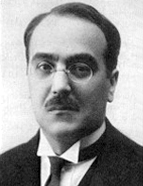

As far as historical time is concerned, Fidelino presented an integrated periodization structure, organized in a descending hierarchy or, in other words, in concentric circles. The first level (or circle) consisted of the "Eras", namely extended periods of time. The "Epochs" were on the second level, which formed part of the "Eras". These were then followed by the "Periods", which were gradations within the "Epochs" and, finally, the "Cycles", which were short variations of time. Fidelino used this temporal structure especially in his works of synthesis, such as his História Literária de Portugal [Literary History of Portugal] (12th to 20th centuries).
Towards the end of his life, Fidelino resumed his reflection on the concept of history. At that time he referred to history as "integral history", in which two planes or levels coexist: one is superficial, related to the episodic facts that occur, collected sensorially, while the other, respecting a deeper reality, and referred to by him as "infra-history", effectively determines superficial history.
Fidelino advocated the conservation and enhancement of national and local libraries and collections, especially those belonging to the Church, ensuring that the application of the Law on the Separation of the State from Churches would not lead to the destruction of these document collections. He thus appealed to the instillment of a historical spirit as a means of safeguarding national memory and identity, in the face of the wave of neophilia ("anti-historicism") following 5 October 1910 (O Espírito Histórico, 1910). It was also with this spirit that the Sociedade Portuguesa de Estudos Históricos was born (1911-1928), following the creation of Historical Societies in other countries as part of the European nationalist movement that had emerged since the mid-19th century. The SPEH's periodical, Revista de História [History Journal], was a way of publicising the studies that were being conducted on national and local history, highlighting the problems of Portuguese society from a historical perspective and, thus, providing grounds for the political choices made by the government. The SPEH also established itself as a centre for the convergence of national and foreign personalities connected to Portuguese history, from different political backgrounds but united on a nationalist and conservative basis. The work accomplished, through the publication of the Revista de História and the organisation of a Library of National Historical Studies, was unparalleled during this period and in the periods to come - the Military Dictatorship and the Estado Novo [New State]. As Secretary of the SPEH and Director of the Journal, Fidelino de Figueiredo played a major role in implementing this project.
